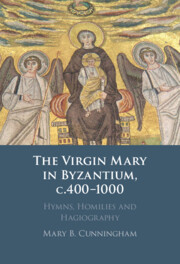The Virgin Mary in Byzantium, c. 400–1000
The Virgin Mary assumed a position of central importance in Byzantium. This book examines her portrayal in liturgical texts during approximately the first six centuries of Byzantine history. Focusing on three main literary genres that celebrated this holy figure, it highlights the ways in which writers adapted their messages for different audiences. Mary is portrayed variously as defender of the imperial city, Constantinople, virginal Mother of God and ascetic disciple of Christ. Preachers, hymnographers and hagiographers used rhetoric to enhance Mary’s powerful status in Eastern Christian society, depicting her as virgin and mother, warrior and ascetic, human and all-holy figure. Their paradoxical statements were based on the fundamental mystery that Mary embodied: she was the mother of Christ, the Word of God, who provided him with the human nature that he assumed in his incarnation. Dr Cunningham’s authoritative study makes a major contribution to the history of Christianity. This title is also available as Open Access on Cambridge Core.
Mary B. cunningham is Honorary Associate Professor of Historical Theology at the University of Nottingham. She has published books and articles in the fields of Byzantine hagiography, homiletics, and theology. In addition to translating Byzantine homilies on the Virgin Mary (2008), she has co-edited books on this subject with Leslie Brubaker (2011) and Thomas Arentzen (Cambridge, 2019). She also sits on the editorial boards of various series, including Translated Texts for Byzantinists and the Society for the Promotion of Byzantine Studies’ book series.

